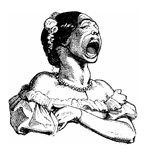
When Luxuries Become Necessities & Necessities Become Luxuries
PERVERSE OUTCOMES
Frederick Pohl’s short story “The Midas Plague,” published in 1954, foretold a future that surely has arrived: a time when the majority of the human population is glutted by material goods and hankers for a simpler life, yet only the well-to-do can afford it. The affluent of today are likeliest to enjoy the pleasures of a yeoman of yore. This, perhaps more than anything now, sets apart the “haves” from the “have-nots.”
It certainly sets them apart geographically. The most expensive cities in America are also the most retro. New York, Chicago, San Francisco, and Boston were built at a time when foot travel was the primary form of transportation. In those cities, you can still swing your two lower appendages to get where you need to go. In Brooklyn, hairy guys amble about like cavemen. (Their trust-fund managers are better kempt.)
I know a fellow who grew up in a section of Greenwich Village when it was still affordable. He, his two siblings, and their parents squeezed into a 400-square-foot apartment in a multistory tenement. Under such straitened circumstances, his dad, a history professor teaching at a college on Staten Island, made the local coffee shop his office. Family dinners often included academic friends whose lively conversation filled the tiny abode with intellectual ferment. My friend remembers walking alongside his mom as she patronized various family-run, mostly Italian businesses: the cheese vendor, the butcher, the baker, and the green grocer, all offering homemade or handcrafted goods at a reasonable cost. He could roam the sidewalks and play in the byways and greenspaces with his chums. With respect to such amenities, urban life probably hadn’t changed much since Florence in A.D. 1450 or Rome in 150 B.C.
Today, the apartment next to his family’s in the same building goes for $5,000 a month for the same square footage. (His family’s is rent-stabilized.) The family-run shops mostly have given way to souvenir outlets catering to tourists. The Italians mostly have moved to the suburbs, where driving cars and texting have eclipsed walking to shops and serendipitous meetings. Indeed, walking has become a focused activity consciously performed for the sake of exercise.
You May Also Enjoy
My colleague suggested, "Some people believe human life is priceless." The government expert replied, "We have no data on that."
The Church is doing practically nothing to make people aware of legitimate green burial or to bring down the costs associated with the funeral industry.
Honoring Christ as Sovereign King is not contrary to or unrelated to the human person’s fulfillment, but rather it is a necessary condition for it.

